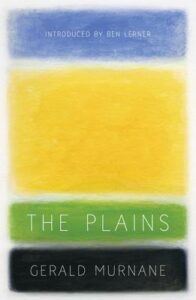Each month, we ask a member of faculty to tell us about one book that played an outsized role in making them who they are today. This month’s contribution to Words to Live By, by MFA Fiction Mentor, Dr. David Huebert, BA(Hons)’08. Though it’s only been a few years since he read his choice for the first time, he credits the book with shaping who he is as a reader and writer.
What book have you chosen?
 The Plains by Australian writer Gerald Murnane.
The Plains by Australian writer Gerald Murnane.
When did you first read this book?
I first read this one in 2021. This was something I struggled with in choosing a book I’ve “lived by”; if I wanted to go with something more long-term formative, I would have chosen Do Androids Dream of Electric Sheep? by Phillip K. Dick or The Word for World is Forest by Ursula K. Le Guin. I read both those books as a teenager and have carried them close ever since. Murnane, though, tilted my world more recently and just as permanently. And it was more special in a way because I read and was astonished by it as an active, trained, working, published writer; as you grow older and read more, such discoveries become increasingly rare.
Was it a book that you read quickly, or did you take your time reading it?
I devoured it, but I did not rush. Sometimes you meet a book that is special enough that you know from the first few pages it is too precious to waste with hasty reading. There was a voice in my ear whispering: experience this, don’t squander it. The Plains is a book to dwell in, to inhabit. One ambles in its cadences, in the sentences that strut and churn, deke and juke. The syntax is a totally alien thing, with a time signature all its own.
What was it about the book that first stood out to you?
I thought: holy cannoli can this guy write landscape. And I thought: man is this totally alien and hypnotic. It occurred to me very quickly that this is not a book that could have ever been written by a Canadian. Although I do think we have biospheres in the Canadian West that are comparable to the Australian grasslands, I don’t think a writer raised in the state called Canada would have ever been able to articulate land in the way Murnane does. I’m not an expert on Australian literature, and I have no doubt Murnane is an anomaly in Australia too, but the book just felt to me powerfully, wonderfully non-Canadian. I say this not to knock CanLit, which I often read adoringly, but just to suggest the particular and powerful and beautiful elsewhere-ness I found in Murnane’s atmosphere and cadences.
Have you reread this book? If so, did you get something different from it on rereading?
I reread it for the occasion of this interview. That said, I had already revisited it several times for essay ideas and just through compulsion. There are books on my shelf that I will pick up spontaneously. I’ll flip through, read a line here or there, as much for the content as for the tactile, sensuous joy of finding communion with them. The Plains is one of these. Moby-Dick is another. On rereading The Plains, you travel deeper into its hallucinatory orbit. The atmosphere thickens. For me, as a writer, I have a better chance of understanding how Murnane does what he does and perhaps borrowing some of his magic.
 How did this book shape you?
How did this book shape you?
Did I even have a shape before I read The Plains? I think, in a very real way, I never truly existed before reading this book. It remoulded me as a writer and a reader. It inverted me, flattened me, pulverized and eviscerated me. At the level of craft, there is one very specific lesson I take away from Murnane, which is about how to use revelations from the atmosphere and setting—the ecological world of the story—as a so-called “button” to end the scene. A change or value shift or arc coming not from the characters but the animate world they inhabit. What a beautiful tool.
What do you think it is about this book that made such an impact?
It is a rare wonder when you come across a writer who is doing something totally new to you at the highest level. The Australian grasslands are a landscape I do not know and never have. I’ve never looked at pictures or videos of this landscape, and I don’t want to. I don’t want to visit it. How could I? In this way, for me, Murnane has made landscape literature more real or vivid than land itself. This is perhaps ethically problematic, but holy crow is it unusually impressive.
Who do you think should read this book?
Everyone who loves sentences; people who love reading about land; readers who want their narrative expectations to be overturned; readers who like philosophy and contemplation and literary puzzles; people who think ecologically and crave unexpected approaches to environmental literature; anyone who has ever looked at a horizon and thought, how could that not be made for contemplation?

